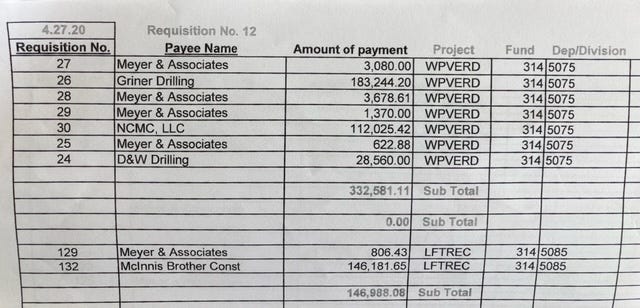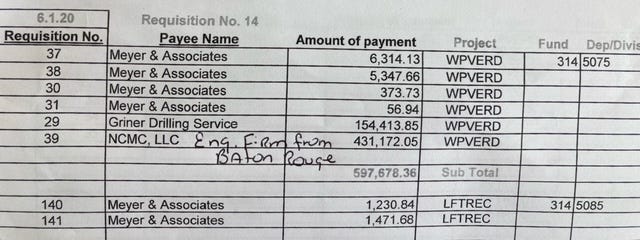Sludge Strikes Again!
Home Gardeners Beware: Don't Put This Stuff On Your Soil & An Update From Sulphur, LA
If you’re looking to garden in your backyard this summer watch out for commercial soil amendments found at big box retailers like Lowe’s, The Home Depot, and Ace Hardware.
A new report from the Sierra Club and the Ecology Center of Michigan reveals alarming levels of PFAS found in home fertilizers.
Surprise, surprise! The more we test, the more we discover that these toxic “forever chemicals” are everywhere.
Many home fertilizer products are commonly made from sewage sludge, aka human waste. This sludge is expensive to get rid of as it needs to be landfilled, so the waste management industry turned it into a cash cow, repackaging the sludge as fertilizer. Now the chemicals in the sludge are getting into our veggies.
“This shows that until we get PFAS off the market we aren’t going to be able to guarantee that it is not in our food supply,” Christy McGillivray, political and legislative director at Sierra Club Michigan told Michigan Advance. “The profits of chemical companies are being prioritized over public health, and we must demand that state and federal agencies halt all uses of PFAS with limited exceptions.”
I’ve been saying it for years… We are getting rid of our toxic waste by creating a secondary product that is toxic and sold in the marketplace for a profit. It’s not right!
Quick Recap: PFAS are a class of industrial chemicals that persist in the environment and our bodies for decades. Industries are allowed to flush PFAS-containing waste into wastewater drains that flow to treatment plants in many places. The chemicals are not removed during sewage treatment and instead settle in solid materials that are separated out from liquids during the treatment process.
The wastewater industry and EPA call treated sludge, “biosolids.” The EPA regulates pathogens and heavy metals like lead, cadmium, and mercury in biosolids, but doesn’t set limits for other chemical contaminants in sewage and wastewater, such as PFAS.
PS: You can read our story about sludge problems in Maine here. And that story continues to unfold as the impact of PFAS on Maine’s food system is still unknown, but a state toxicologist recently admitted to finding these chemicals in vegetables like leafy greens.
PFAS was found in all nine products tested, even ones marketed as “eco” or “natural,” which means garden crops could become another source of PFAS exposure for home gardeners. The nine fertilizers tested include:
Cured Bloom (Washington DC)
TAGRO Mix (Tacoma, Washington)
Milorganite 6-4-0 (Milwaukee, Wisconsin)
Pro Care Natural Fertilizer (Madison, Georgia)
EcoScraps Slow-Release Fertilizer (Las Vegas, Nevada)
Menards Premium Natural Fertilizer (Eau Claire, Wisconsin)
GreenEdge Slow Release Fertilizer (Jacksonville, Florida)
Earthlife Natural Fertilizer (North Andover, Massachusetts)
Synagro Granulite Fertilizer Pellets (Sacramento area, California)
PFOA and PFOS chemicals found in the biosolid products were at least a thousand times higher than Michigan’s drinking water limits, according to Ecology Center senior scientist Gillian Z. Miller.
Plastic Problems Too
If the PFAS isn’t enough to deter you from these garden amendments, then maybe the microplastics will do it. A study by UCLA scientists suggests that fertilizer could contain far more plastic particles, we’re talking as much as 25 times more, than was previously suspected.
“You can detect when microplastics come in to treatment plants, but the moment they’ve gone through the treatment, we can’t detect most of them anymore,” said Sanjay Mohanty, a UCLA professor of civil and environmental engineering and the study’s corresponding author in a statement. “Since most plastic materials are not readily biodegradable, our concern is the biosolids produced by treatment plants contain a lot of pollutants that could stick to the microplastics.”
The authors write that further research is needed to better understand where microplastics go after wastewater is processed, and to better understand the risks to human and environmental health, but sounds to me like we are headed for a toxic storm!
One way to avoid these products is to check the label. See that the “guaranteed analysis” product label does not contain terms like “biosolids,” “residuals” or “municipal waste.” And talk to the employees at garden centers and hardware stores to let them know your concerns.
Meanwhile In Sulphur, LA…
Officials are still in hot water as more residents in this Louisiana town organize and speak out about the brown water that has plagued their taps for years.
On Thursday, May 27, the city council held a special meeting to approve a bid for a Sulphur water main, but when residents tried to ask questions about the water, officials acted ugly.
According to community members who attended the meeting, Mayor Mike Danahay flipped off one community member and yelled at a woman who tried to ask him a question. Council Member Mike Koonce representing District 2 (where the water is particularly problematic) started a verbal fight with three residents.
Not a good look for elected officials who say they are working on the problem!
The local news covered the event, but the KPLC reporter left out these details, making it seem as if the residents were just rowdy.
I can’t tell you how upset I would be if I had to drink or bathe in that water. These people deserve respect and thoughtful conversations.
Instead, officials are doubling down on rhetoric that they are working on the problem, but have not offered information about what’s taking so long or specific financial details about where allotted money has already gone for the water issues.
Financial records that citizens have obtained from the city show massive payouts to engineering and drilling services in 2020, yet the problems persist.
“We’re bathing in this, we’re drinking it,” Sulphur resident Terry Anderson told us. “We didn’t leave the meeting upset about the water. The residents are upset about the actions of this administration and the way they treated us.”
Independent lab results from the tap water at her home were troubling, as it tested high for lead, iron, nickel, and manganese. All of these metals can impact the body and contribute to serious health issues.
For example, lead is a heavy metal and known neurotoxin that most often enters water by corrosion of aging pipes, household plumbing systems, from the erosion of natural deposits nearby, and by industrial activity waste streams. Changes in water chemistry (pH) can have a substantial impact on the release of lead into your water.
The City of Sulphur, much like the City of Flint, has a serous problem with radical shifts in basic water chemistry, which causes lead leaching, among other serious contamination issues. Mismanagement of the chemical dose and lack of proper maintenance are also to blame for these water woes.
Residents are continuing to meet up and discuss the water problems. This Sunday, June 6, they are meeting at Heritage Square park from 2-5 p.m. for a friendly conversation about the town’s water issues. A Walk for Water has also been planned for the next council meeting on June 14, where community members plan to walk from the mayor’s office to the council chambers with signs to help raise awareness.









Thank you for letting us know about all of this shit
It never seems to end
& then.... IRL insult to injury they are allowed to tell everyone the stufffff you're buying & using is "ORGANIC" too & #2.... so full of kah-kah!